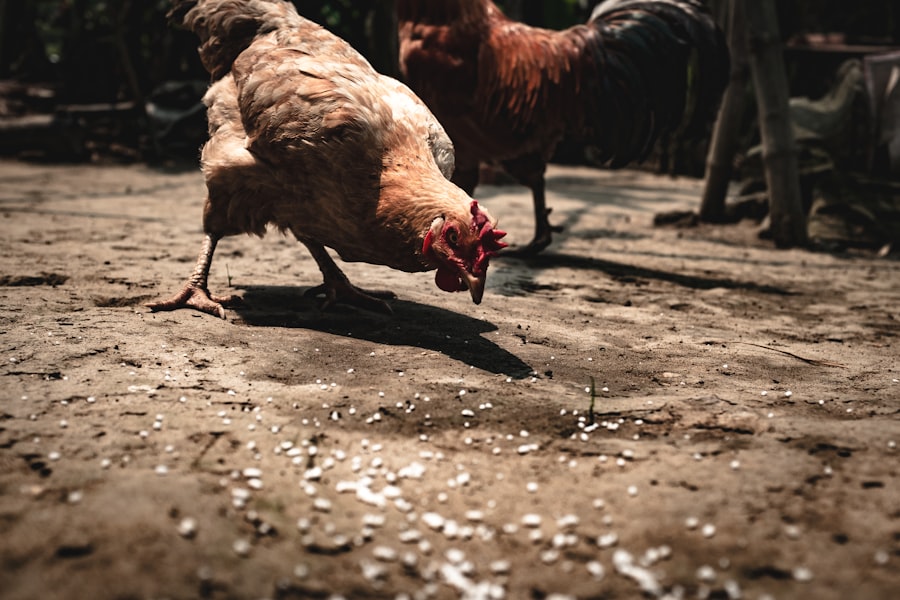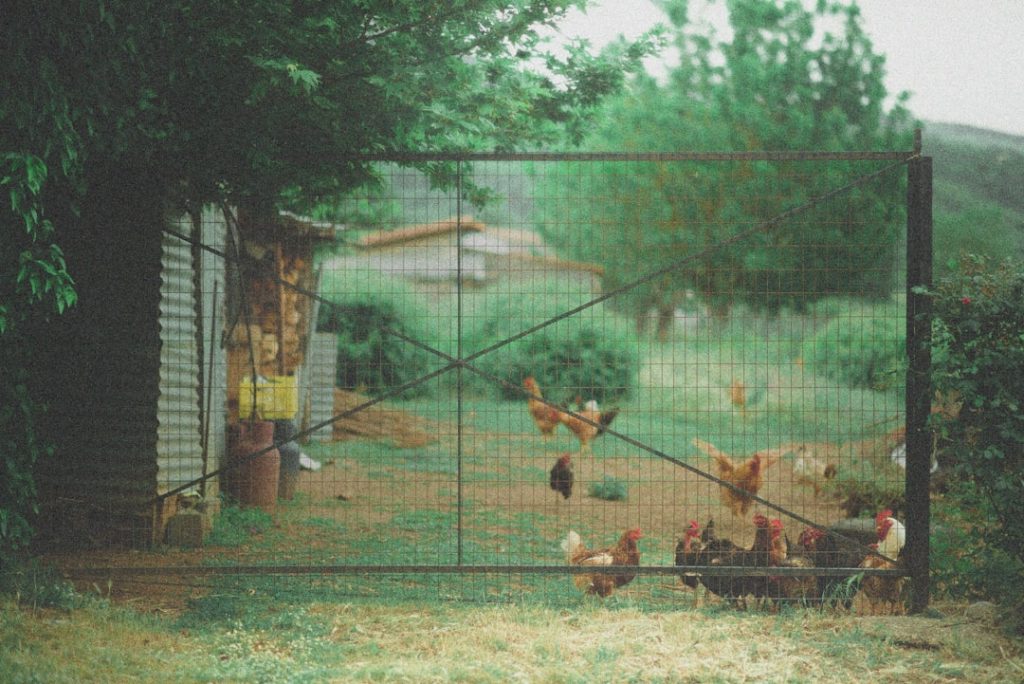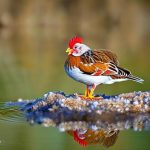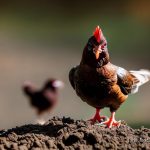Free range farming has gained popularity in recent years as consumers become more aware of animal welfare issues in food production. This method allows chickens to roam and forage in a natural environment, which benefits both the animals and the quality of their products. Free range chickens have access to outdoor spaces, enabling them to engage in natural behaviors such as scratching, pecking, and dust bathing, which are crucial for their physical and mental health.
The practice of free range farming also has environmental benefits. Chickens foraging on pasture can help control pests and weeds, reducing the need for chemical pesticides. Their droppings contribute to soil fertility, and their presence promotes biodiversity by allowing interaction with other wildlife and plants.
Free range farming produces eggs and meat that are often considered healthier and more flavorful due to the chickens’ natural diet and increased physical activity. This method of farming aligns with growing consumer demand for ethically produced food and supports sustainable agricultural practices. The importance of free range farming for chickens extends beyond animal welfare, encompassing environmental sustainability and the production of high-quality, nutritious food.
As such, it has become a significant consideration for both consumers and farmers interested in ethical and sustainable food production practices.
Table of Contents
- 1 Providing a suitable environment for free range chickens
- 2 Feeding and watering free range chickens
- 3 Protecting free range chickens from predators
- 4 Monitoring the health of free range chickens
- 5 Providing enrichment for free range chickens
- 6 Ensuring proper care and maintenance for free range chickens
- 7 FAQs
Key Takeaways
- Free range allows chickens to exhibit natural behaviors and improves their overall welfare
- A suitable environment includes access to outdoor space, shelter, and protection from extreme weather conditions
- Free range chickens should have access to a balanced diet and clean, fresh water at all times
- Predators can be deterred with proper fencing, secure coops, and the use of guard animals
- Regular health checks, vaccinations, and parasite control are essential for maintaining the well-being of free range chickens
Providing a suitable environment for free range chickens
Space and Movement
Providing ample space for chickens to roam and forage is crucial for their physical and psychological health. A minimum of 4 square feet per bird is recommended to ensure they have enough room to move around and engage in natural behaviors.
Shelter and Protection
Providing shelter such as coops or shelters is important to protect chickens from extreme weather conditions and predators. This shelter should be designed to provide a safe and comfortable space for the chickens to retreat to when needed.
Access to Food and Water
Access to food and water is also crucial in a free range system. Chickens should have access to a balanced diet that includes grains, greens, insects, and other natural foods they can forage for. Additionally, providing access to clean water at all times is essential for their hydration and overall health. It’s important to regularly monitor the environment to ensure that it remains suitable for the chickens, making adjustments as needed to accommodate changes in weather or other factors.
Feeding and watering free range chickens

Feeding and watering free range chickens is an important aspect of their care and well-being. In a free range system, chickens have the opportunity to forage for natural foods such as insects, grasses, and seeds, which contributes to a more varied and nutritious diet. However, it’s still important to supplement their diet with commercial feed to ensure they receive all the necessary nutrients.
Providing access to clean water at all times is also crucial for their hydration and overall health. When feeding free range chickens, it’s important to provide a balanced diet that includes grains, greens, and protein sources such as insects or mealworms. Additionally, providing access to grit is important for their digestion, as it helps them break down food in their gizzards.
It’s also important to monitor their feed consumption and adjust accordingly based on their activity level and seasonal changes. In addition to feeding, providing access to clean water at all times is essential for free range chickens. Water is crucial for their hydration, digestion, and overall health.
It’s important to regularly clean and refill water containers to ensure that the water remains clean and accessible to the chickens. Feeding and watering free range chickens involves providing a balanced diet that includes grains, greens, and protein sources, as well as access to clean water at all times. By ensuring that chickens receive proper nutrition and hydration, farmers can support their health and well-being in a free range environment.
Protecting free range chickens from predators
Protecting free range chickens from predators is essential for their safety and well-being. When chickens are allowed to roam freely in a natural environment, they are vulnerable to predation from animals such as foxes, raccoons, hawks, and even domestic pets. To protect them from predators, it’s important to implement measures such as secure fencing, predator-proof coops or shelters, and the use of guardian animals.
Secure fencing is an effective way to keep predators out of the free range area. Fencing should be buried underground or secured with wire mesh to prevent predators from digging underneath or climbing over. Additionally, using electric fencing can provide an added layer of protection against predators such as foxes or raccoons.
Providing predator-proof coops or shelters is also important for protecting free range chickens from predators. Coops should be constructed with sturdy materials and secure latches to prevent entry by predators. Additionally, using motion-activated lights or alarms can help deter nocturnal predators from approaching the coop.
In some cases, using guardian animals such as dogs or geese can help protect free range chickens from predators. These animals can help deter predators through their presence and vocalizations, providing an added layer of protection for the flock. Protecting free range chickens from predators involves implementing measures such as secure fencing, predator-proof coops or shelters, and the use of guardian animals.
By taking these precautions, farmers can help ensure the safety and well-being of their free range chickens.
Monitoring the health of free range chickens
Monitoring the health of free range chickens is essential for identifying and addressing any potential issues that may arise. When chickens are allowed to roam freely in a natural environment, they are exposed to various environmental factors that can impact their health. It’s important to regularly observe the flock for signs of illness or injury, as well as implement preventative measures such as vaccination and parasite control.
Regular observation of the flock is important for identifying any signs of illness or injury in free range chickens. Common signs of illness include lethargy, decreased appetite, abnormal droppings, respiratory issues, or changes in behavior. By regularly observing the flock, farmers can identify any potential issues early on and take appropriate action.
In addition to observation, implementing preventative measures such as vaccination and parasite control is important for maintaining the health of free range chickens. Vaccination can help protect against common poultry diseases such as Newcastle disease or infectious bronchitis. Additionally, implementing a regular deworming program can help control internal parasites that may impact the health of the flock.
Regular veterinary check-ups are also important for monitoring the health of free range chickens. A veterinarian can provide guidance on preventative care measures as well as diagnose and treat any health issues that may arise in the flock. Monitoring the health of free range chickens involves regular observation of the flock for signs of illness or injury, implementing preventative measures such as vaccination and parasite control, and seeking veterinary care when needed.
By monitoring their health closely, farmers can help ensure the well-being of their free range chickens.
Providing enrichment for free range chickens

Natural Behaviors and Exploration
One way to provide enrichment for free range chickens is by offering opportunities for them to engage in natural behaviors such as scratching and pecking. Scatter grains or treats in the outdoor area to encourage them to forage and explore their surroundings. Additionally, providing access to natural materials such as logs or branches can give them opportunities to peck and scratch at different textures.
Dust Bathing and Perching
Dust bathing is another natural behavior that is important for the health of chickens. Providing a designated area with fine sand or dust where they can bathe helps keep their feathers clean and healthy while also providing an enriching activity. Additionally, providing perches or roosts in the outdoor area gives chickens opportunities to rest off the ground while also promoting natural behaviors such as roosting and socializing with other flock members.
Promoting Well-being through Enrichment
Providing enrichment for free range chickens involves offering opportunities for them to engage in natural behaviors such as scratching, pecking, dust bathing, and perching. By providing enriching activities in their outdoor environment, farmers can promote the physical and psychological well-being of their free range chickens.
Ensuring proper care and maintenance for free range chickens
Ensuring proper care and maintenance for free range chickens involves regular attention to their needs and environment. This includes providing regular access to food and water, monitoring their health closely, protecting them from predators, maintaining clean living conditions, and addressing any potential issues that may arise. Regular access to food and water is essential for the well-being of free range chickens.
It’s important to regularly check feeders and waterers to ensure they are clean and filled at all times. Additionally, monitoring their feed consumption can help ensure they are receiving adequate nutrition. Monitoring the health of free range chickens involves regular observation of the flock for signs of illness or injury.
It’s important to address any potential issues early on by seeking veterinary care when needed. Protecting free range chickens from predators involves implementing measures such as secure fencing, predator-proof coops or shelters, and the use of guardian animals. Regular maintenance of these protective measures is important for ensuring the safety of the flock.
Maintaining clean living conditions is important for promoting the health of free range chickens. Regularly cleaning coops or shelters, removing soiled bedding, and providing access to clean water helps prevent disease and promote overall well-being. Ensuring proper care and maintenance for free range chickens involves regular attention to their needs and environment.
By providing regular access to food and water, monitoring their health closely, protecting them from predators, maintaining clean living conditions, and addressing any potential issues that may arise, farmers can support the well-being of their free range chickens.
If you’re looking for tips on how to keep free range chickens, you might also be interested in this article on chicken coop interior ideas. Creating a comfortable and functional living space for your chickens is essential for their well-being and productivity. This article offers practical advice on how to design the interior of your chicken coop to meet the needs of your flock.
FAQs
What are free range chickens?
Free range chickens are poultry that are allowed to roam freely outdoors, with access to natural vegetation and insects. They are not confined to cages or small enclosures.
How do you keep free range chickens?
To keep free range chickens, you need to provide them with a secure coop for shelter at night, access to fresh water and feed, and a large outdoor area for them to roam and forage.
What should free range chickens be fed?
Free range chickens should be fed a balanced diet that includes a mixture of grains, seeds, and greens. They also benefit from foraging for insects and other natural foods in their environment.
How much space do free range chickens need?
Free range chickens need at least 2-3 square feet of space per bird inside the coop, and a minimum of 10 square feet of outdoor space per bird for foraging.
What are the benefits of keeping free range chickens?
Keeping free range chickens allows them to exhibit natural behaviors, such as scratching and pecking, and provides them with a more varied and nutritious diet. Additionally, their eggs and meat may be of higher quality.
What are the challenges of keeping free range chickens?
Some challenges of keeping free range chickens include predator attacks, disease transmission, and potential damage to gardens or landscaping from their foraging activities. Regular monitoring and proper management can help mitigate these challenges.
Meet Walter, the feathered-friend fanatic of Florida! Nestled in the sunshine state, Walter struts through life with his feathered companions, clucking his way to happiness. With a coop that’s fancier than a five-star hotel, he’s the Don Juan of the chicken world. When he’s not teaching his hens to do the cha-cha, you’ll find him in a heated debate with his prized rooster, Sir Clucks-a-Lot. Walter’s poultry passion is no yolk; he’s the sunny-side-up guy you never knew you needed in your flock of friends!







